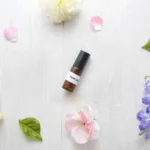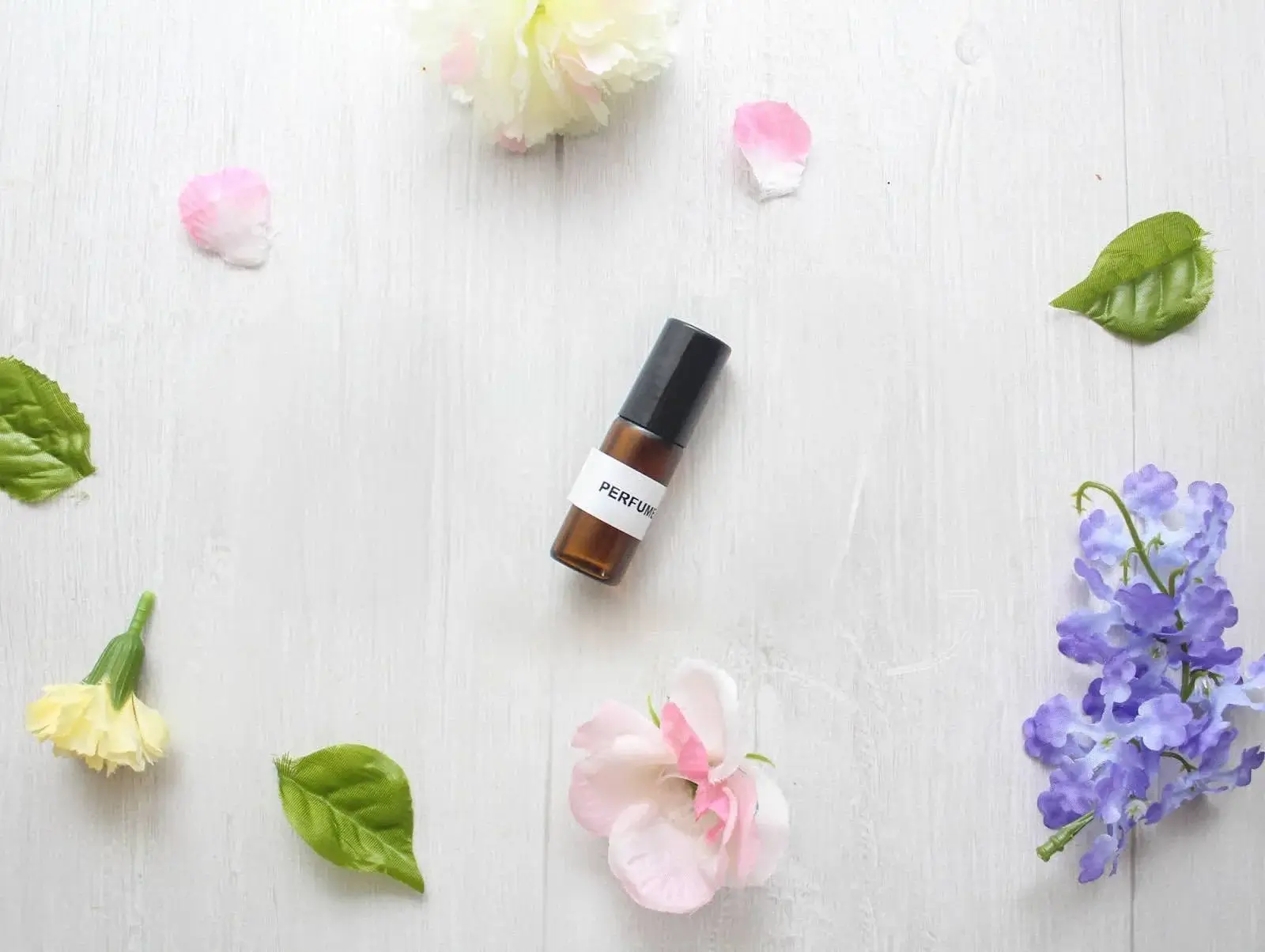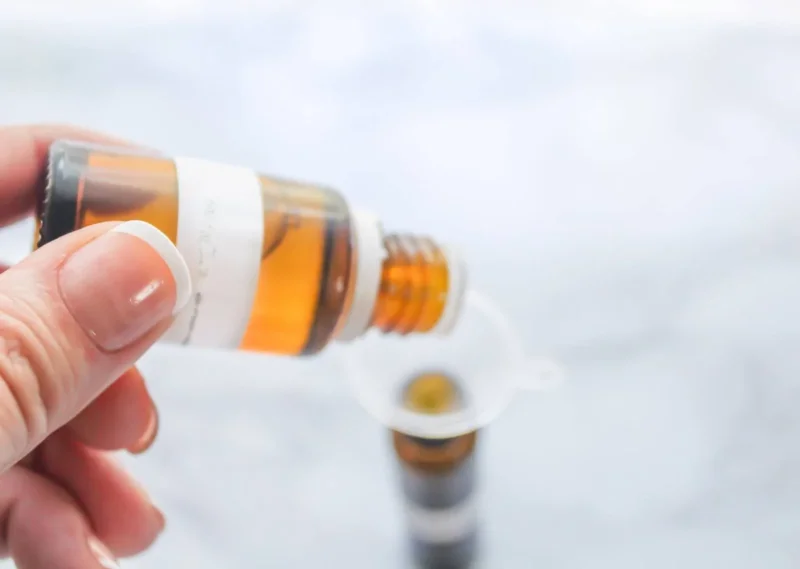It’s time to ditch artificial fragrances and embrace DIY essential oil perfume. Store-bought perfumes might look fancy on the shelf, but behind the beautiful packaging are synthetic fragrance oils and undisclosed chemicals that can wreak havoc on your hormones, skin, and nervous system. From migraines and allergic reactions to potential cancer risks, these products often come with more danger than delight.
Case in point: We’ve all been to the mall and nearly fainted going by certain stores or getting sprayed by a “helpful” perfume salesperson! Even now, I have to hold my nose or I get a headache.
Thankfully, there’s a better option. God gave us plants that smell amazing and support our health! Essential oils can be blended into your favorite non-toxic perfumes that reflect your unique beauty, without compromising your wellness.
Table of Contents
The Hidden Dangers in Women’s Perfume
Most commercial perfumes are made with a combination of synthetic fragrance oils, solvents, and preservatives, often listed under one catch-all word: fragrance. This trade-secret label can mask dozens of harmful chemicals that are absorbed through the skin or inhaled into the lungs.
Dangerous Chemicals Commonly Found in Perfume
These toxins are added to body care products to extend shelf life, mimic natural aromas, and ensure the scent clings to skin or clothing. But they come at a cost:
- Aldehydes – Add sharp, bright notes to perfume. Trigger migraines, asthma, and respiratory distress.
- Benzaldehyde & Benzyl Acetate – Scent ingredients that may cause coughing, eye irritation, and organ toxicity.
- BHT (Butylated Hydroxytoluene) – Preserves fragrance shelf life. Suspected endocrine disruptor.
- Ethyl Acetate – A solvent that enhances blendability. Can irritate the lungs, eyes, and mucous membranes.
- Methylene Chloride – Banned for toxicity, but still present in some formulas. Linked to liver, heart, and nervous system damage.
- Musk Ketone – Used as a scent fixative. Persistent in the environment and body, disrupting hormones and causing allergic reactions.
- Oxybenzone – UV absorber found in some fragrance formulas. Mimics estrogen and may affect reproductive health.
- Parabens – Preservatives that prevent microbial growth. Mimic estrogen, disrupt hormone balance, and are linked to breast cancer and skin irritation.
- Phthalates – Used to make scent last longer. Linked to hormone disruption, reproductive problems, developmental delays, and potential cancer risk. Also classified as obesogens, which may contribute to weight gain and metabolic imbalance.
- Styrene – Enhances fragrance projection. Known carcinogen that affects the central nervous system and may cause headaches, depression, and fatigue.
- Toluene – A solvent and stabilizer. Known carcinogen and neurotoxin, hazardous even in small amounts.
- Triclosan – Antimicrobial agent. Can disrupt the immune system and is linked to antibiotic resistance.
If it doesn’t nourish your body or uplift your spirit, it doesn’t belong on your skin.
Harm to Your Health from Perfumes
A study from Vanderbilt University analyzed several popular department store perfumes and found that every single one contained harmful chemicals like those listed above. In fact, they included several compounds, each known to have a negative impact on health.
These short-term and long-term effects include:
- Carcinogenicity (increased cancer risk)
- Eye and skin irritation
- Hormonal imbalances and endocrine disruption
- Neurological issues (headaches, dizziness, depression, convulsions)
- Reproductive and developmental toxicity (including fertility issues)
- Respiratory sensitivity (asthma, coughing, etc.)
Why DIY Essential Oil Perfume Is Safer
Essential oils are natural fragrance oils derived from plants that not only smell divine but also support your health. These skin-safe alternatives allow you to create a gorgeous perfume that matches your personality, without all the hidden toxins.
Beautiful Oils for Women’s Natural Perfume
- Bergamot – Uplifting and citrusy with a hint of floral, bergamot helps melt away stress and bring emotional clarity.
- Geranium – Fresh and slightly rosy, geranium supports radiant skin and balances mood swings, especially helpful during hormonal shifts.
- Grapefruit / Lemon / Lime / Orange (Choose one) – These citrus oils are bright, energizing, and joyful. They add a cheerful top note and boost mood naturally.
- Lavender – Calming, clean, and gentle. Lavender brings emotional peace and soothes both the skin and the soul.
- Vanilla Absolute (CO2 or Oleoresin) – Rich, warm, and comforting. This grounding base note adds depth and a touch of sweetness to your blend.
- Ylang Ylang – Deep floral with sweet, sensual tones. Ylang ylang promotes heart health, hormone harmony, and emotional release.
Understanding Perfume Notes: Head, Heart, and Base
Great perfume unfolds over time. Blending your essential oils into head notes (top notes), heart notes (middle notes), and base notes creates a more dynamic and layered scent experience.
- Head Notes (first scent): Citrus oils, eucalyptus, peppermint
- Heart Notes (middle layer): Clary sage, geranium, lavender
- Base Notes (foundation): Sandalwood, ylang ylang, vanilla
A well-balanced essential oil blend will typically include all three categories.
Choosing the Right Base: Carrier Oils vs. Alcohol
To turn your perfume oils into a usable form, you need a natural carrier oil or base to mix the drops of essential oil into.
- Carrier Oils: Organic jojoba oil and fractionated coconut oil are skin-safe, long-lasting, and great for roll-ons
- Alcohol Base: Use 80+ proof vodka or perfumers alcohol for spray perfumes
- Unscented Witch Hazel: This would count as an alcohol style carrier base.
Basic Perfume Ratio:
Use 20-30 drops of essential oil per 1 ounce of carrier. (Try the 20-50-30 percent process: 20% drops head notes, 50% drops heart, 30% base in handmade perfumes.)
DIY Essential Oil Perfume Recipe
This simple, skin-safe perfume blend is a perfect introduction to natural fragrance making.

Uplift - Ladies Essential Oil Perfume Roll-On
Quantity
Ingredients
- 8 drops lavender essential oil
- 6 drops bergamot essential oil
- 6 drops geranium essential oil
- 6 drops vanilla absolute CO2, OR oleoresin
- 4 drops grapefruit OR lemon OR lime OR orange essential oil
- 4 drops ylang ylang essential oil
- Organic jojoba oil OR fractionated coconut oil OR a combination of both, to fill the bottle*
Supplies
- 10ml glass roll-on bottle
Instructions
- Add the essential oils to a glass roll-on bottle and gently swirl to mix.
- Fill the remaining space of your roller bottle with the carrier oil of your choice. Gently pop the roller top back on, secure the cap, and give it a good shake to blend everything together.
- Apply to wrists and back of neck each morning.
Notes

Uplift - Ladies Essential Oil Perfume Spray
Quantity
Ingredients
- 20 drops lavender essential oil
- 15 drops bergamot essential oil
- 15 drops geranium essential oil
- 15 drops vanilla absolute, CO₂ OR oleoresin
- 10 drops grapefruit OR lemon OR lime OR orange essential oil
- 10 drops ylang ylang essential oil
- Organic jojoba oil OR fractionated coconut oil OR a combination of both, to fill the bottle* **
Supplies
Instructions
- Add the essential oils to the glass spray bottle and gently swirl to mix.
- Fill the remaining space with the carrier oil of your choice.
- Shake to mix and spray on wrists and back of neck each morning.
Notes
**For a traditional perfume, omit the carrier oil and instead use a combination of perfumers alcohol and unscented witch hazel.
Step One: Add Essential Oils
Add the essential oils to your glass roller bottle and gently swirl to mix. Fill the remaining space with the carrier oil of your choice. Shake to mix and apply to wrists and back of neck each morning.
Packaging, Storage & Safety Tips
Before gifting or using your homemade creations, it’s essential to consider how you’ll package and preserve them. Proper storage keeps your blends fresh and effective, while thoughtful packaging enhances the entire experience, especially when sharing them with others.
These tips will help you protect your ingredients, extend their shelf life, and ensure your DIY goodies are as safe, beautiful, and beneficial.
- Label your DIY essential oil perfume with ingredients and the date.
- Avoid spill damage by storing upright and away from fabric like tablecloths.
- Store in a cool, dry place. Shelf life: 6-12 months.
- Shake before use. Avoid direct sun exposure after using citrus oils. Click here to learn more about phototoxicity.
Creating Your Signature Scent with Heart
Scent is deeply personal. It reflects your mood, your memories, and even your mission. Whether you’re preparing for a day at church, a quiet evening at home, or a date night with your spouse, your signature scent can be part of your daily self-care routine.
Fragrance is a form of stewardship—an opportunity to bless your body, your loved ones, and your home with the goodness God created.
Making your own perfume isn’t just fun and affordable—it’s part of choosing a lifestyle that reflects your values. You don’t need artificial chemicals to feel beautiful. You were fearfully and wonderfully made, and your scent should reflect that!
As Proverbs 27:9 says, “Ointment and perfume delight the heart…” Let your perfume be an offering of love to your body, your spirit, and the people around you.
- https://pmc.ncbi.nlm.nih.gov/articles/PMC9163252/
- https://pubmed.ncbi.nlm.nih.gov/28683407/
- https://cdn.vanderbilt.edu/vu-wordpress-0/wp-content/uploads/sites/16/2015/04/19124012/Lee.pdf
- https://pubmed.ncbi.nlm.nih.gov/9577937/
- https://www.ewg.org/news-insights/news/2025/04/despite-health-harm-concerns-bha-and-bht-remain-food-and-cosmetics
- https://pubchem.ncbi.nlm.nih.gov/compound/4632
- https://stanfordhealthcare.org/content/dam/SHC/clinics/menlo-medical-clinic/docs/Allergy/Patch%20Testing.pdf











